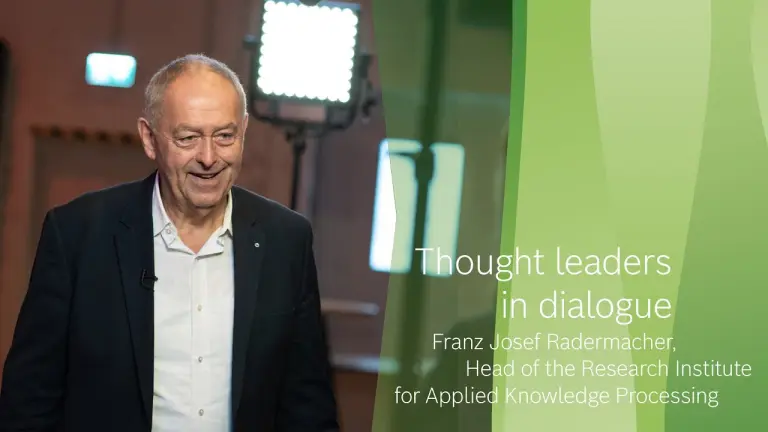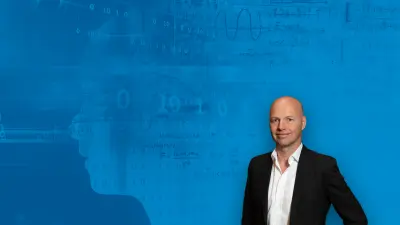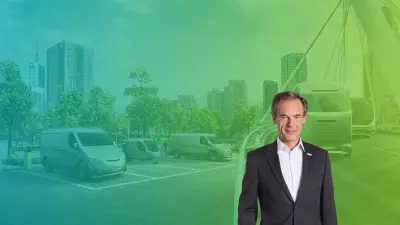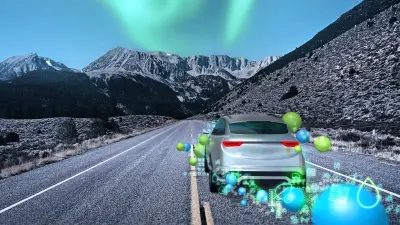The power of green energy
In dialogue with the expert on globalization and sustainability

2020-08-04
Franz Josef Radermacher argues for rising prosperity, but this should not add to climate change. To get there, he maintains for the combination of new technological options and nature-based solutions.

“People strive for prosperity and for a good life,” says Franz Josef Radermacher. The climate expert and computer scientist is leading the Research Institute for Applied Knowledge Processing (Forschungsinstitut für anwendungsorientierte Wissensverarbeitung, FAW) in the southwestern German city of Ulm. One of the focuses of his work is globalization and the challenges it will bring in the future. Radermacher estimates that there will be approximately ten billion people on the planet by 2050. That is a good third more than today. If everyone was to live prosperously, a lot of energy would be required. “How can this energy be generated and what will be the effects of the carbon dioxide produced?” asks Radermacher, who, for example, has the rapid development in China in mind when discussing the side effects of a booming society.
“China brought 500 million people out of poverty. The prize? In the last five years, it did more in construction and buildings than the rest of the world in the last century.”
Advocat for eco-social market economy
Rademacher’s questions highlight a dilemma: it does not seem possible to consolidate the facilitation of growth in social prosperity and fighting climate change. As an advocate for the social market economy, however, Radermacher wants to achieve exactly that and reconcile social and sustainable economic activity. “We could solve the climate problem by going into poverty, no cars, no heating, you do not use planes, you do not eat meat,” says Radermacher, knowing full well that will not work. “The rich people don’t want to become poor to solve the climate issues and the poor people want to become rich. And that adds to the climate challenge the world is facing.”
Technology is the way out
So, he is on the lookout for new ideas — and has already found some: “As always in history, the only peaceful, soft solution is technology.” This requires technology that converts renewable energies into electricity at reasonable prices. However, “with electricity, we can only solve half of the problem of our civilization.” For Radermacher, it is obvious that much more needs to be done, especially in the transportation sector. He considers hydrogen and synthetic fuels to be promising green electricity alternatives: “In the world’s deserts, there is enough sun and space to produce hydrogen through electrolysis,” he adds.
The hydrogen could then be combined with carbon dioxide (CO₂) to form methanol. The clever thing here is that although methanol is used to power internal-combustion engines, synthetic fuel balances out the effect on the climate — unlike gasoline or diesel. This is because the combustion process only releases as much CO₂ as was previously removed from the atmosphere. “If this kind of recycling takes place on a large scale, emissions can be significantly reduced,” says Radermacher. The right technologies could, therefore, provide a major contribution to solving this dilemma.
Recycling CO₂ can help reduce emissions by 80 percent.
Nature-based solutions
However, according to Radermacher, other options exist in the form of what are known as nature-based solutions. For example, the protection of the rainforest, wide-scale reforestation, or agricultural humus formation. These measures all remove CO₂ from the atmosphere and deposit it deep underground by means of biological sequestration. “Nature-based solutions are the only area in which more and more prosperity goes hand in hand with less CO₂,” says Radermacher. These are exactly the kinds of solutions that he has been pursuing. “It is quite unusual, but it works.”
An interview with Franz Josef Radermacher, Head of the Research Institute for Applied Knowledge Processing

Loading the video requires your consent. If you agree by clicking on the Play icon, the video will load and data will be transmitted to Google as well as information will be accessed and stored by Google on your device. Google may be able to link these data or information with existing data.
Profile

Franz Josef Radermacher
Computer science professor at the University of Ulm and Head of the Research Institute for Applied Knowledge Processing
Nature-based solutions are the best we can do combined with reasonable solutions in the field of energy.
Radermacher strongly advocates for an eco-social market economy and is involved in the Global Marshall Plan Initiative, which is pushing for globalization that is fair. He is a member of the Club of Rome, President of the Senate of the Economy and Honorary President of the Ecosocial Forum Europe. Since 1987, he has held the role of Head of the Research Institute for Applied Knowledge Processing (FAW) in Ulm (FAW/n since 2005).
Summary
Franz Josef Radermacher wants to address the issue posed by growing prosperity and climate change using nature-based solutions and green energy. The former pools CO₂ underground, while the latter conserves fossil resources and makes it possible to recycle CO₂ using hydrogen.


